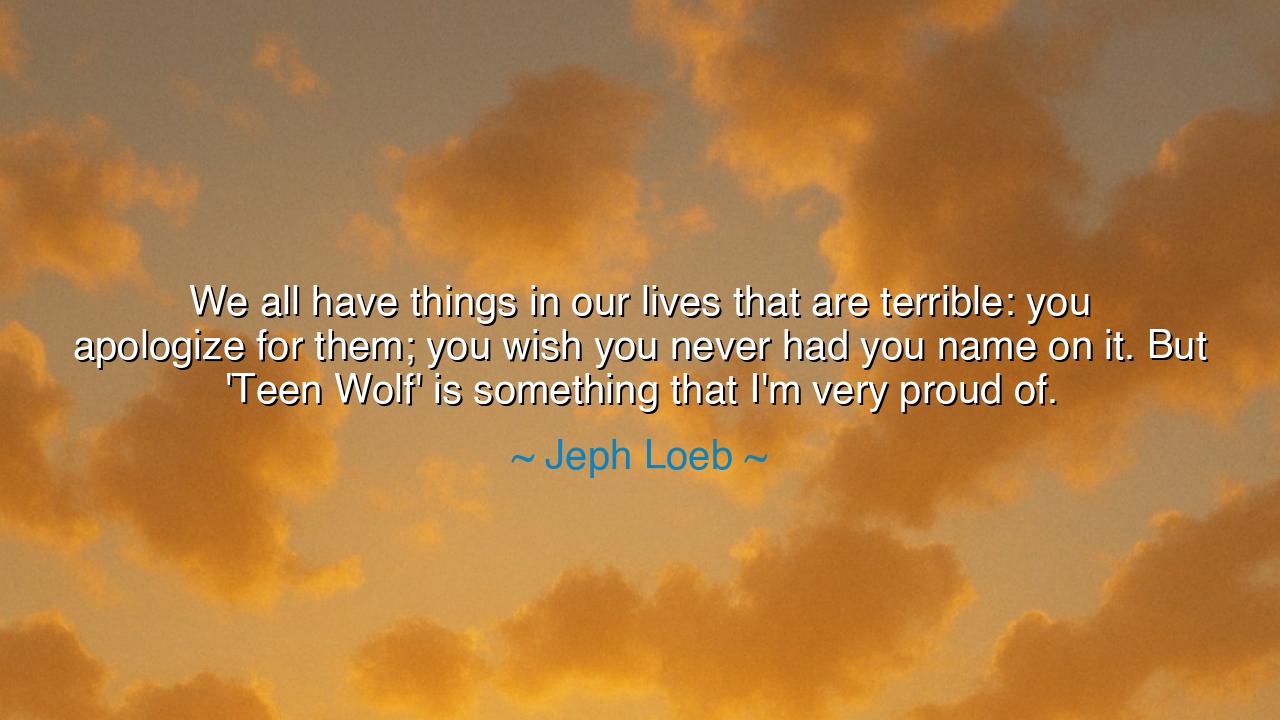
We all have things in our lives that are terrible: you apologize
We all have things in our lives that are terrible: you apologize for them; you wish you never had you name on it. But 'Teen Wolf' is something that I'm very proud of.






Hear the words of Jeph Loeb, who confessed with honesty and pride: “We all have things in our lives that are terrible: you apologize for them; you wish you never had your name on it. But ‘Teen Wolf’ is something that I’m very proud of.” These words, spoken with humility, reveal an ancient truth: that the journey of creation is filled with both failure and triumph, with works that shame us and works that exalt us. Yet the measure of a life is not found in perfection, but in the courage to create, to endure mistakes, and to still produce something worthy of pride.
Loeb acknowledges that in every career, in every life, there are deeds or creations that one might wish undone. This is the burden of all who labor in the world: the architect who designs a flawed building, the statesman who signs an ill-considered law, the poet who releases weak verses. Such moments weigh heavily on the spirit, and many cannot bear to look upon their past without bitterness. But Loeb does not deny these failures; he names them plainly and moves beyond them. His pride in ‘Teen Wolf’ shines all the brighter against the shadow of his earlier regrets.
Consider the tale of Thomas Edison, who before perfecting the light bulb endured a thousand failures. Many mocked him, claiming his name was tied to folly. Yet Edison, like Loeb, accepted that failure is the companion of all creators. When the light finally shone, his earlier mistakes did not diminish the victory—they gave it depth. In the same way, Loeb’s words remind us that even if some works bring shame, one great and enduring achievement can stand as a beacon of pride.
The power of his declaration lies also in gratitude. To say that ‘Teen Wolf’ is something he is proud of is to honor the cast, the crew, and the fans whose devotion gave the story life. Pride in such a creation is not arrogance, but recognition that art can outlive its makers, that a story can become a bond between thousands of souls. This is the triumph that redeems the regrets: the knowledge that one’s name is tied to something that brought meaning and joy to others.
There is also wisdom here about the nature of legacy. For none among us will leave a flawless record. Even the greatest leaders have stains upon their names. Abraham Lincoln bore the burden of political defeats before he bore the crown of emancipation. Leonardo da Vinci left behind unfinished works among his masterpieces. Yet what the world remembers, what endures through time, are the triumphs. Loeb’s pride in Teen Wolf is a reminder that our legacy is not erased by our failures, but defined by our best works.
The lesson is thus: do not be paralyzed by the weight of your mistakes. They are part of your story, but they do not define its ending. Instead, strive to create that one work, that one deed, that one offering of your spirit that you can hold proudly before the world. Seek to produce something that outshines your regrets, not by denying them, but by rising above them.
So let Jeph Loeb’s words be a teaching for all generations: every life has its shadows, but even a single light can pierce the darkness. Be not ashamed of your failures, but use them as fuel to pursue the work that will bring you honor. And when you find it—whether it be art, service, love, or truth—hold it proudly, as Loeb holds Teen Wolf. For in the end, it is not the failures that echo across time, but the victories that rise above them.






AAdministratorAdministrator
Welcome, honored guests. Please leave a comment, we will respond soon